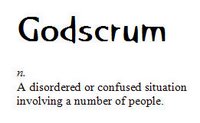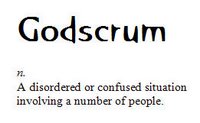More Testimony

After checking out of the
Lick it Up room, I grabbed an early breakfast and headed across the bridge to play tourist for a day before the start of my Sunday business conference. For as often as I come up here for business--once or twice a month--I never actually am able to set aside time to take in the Bay Area, which is truly one of the most beautiful places on the planet.
At the top of my list was Muir Woods, a forest of old-growth redwoods that is so special that when the delegates to the first UN conference in San Francisco met here in 1945, they came up to Muir Woods to take a group photograph and to lay a commemorative plaque. The grove they posed in front of hasn't changed in the 60 years that have passed since then. Neither has man's belief that the UN can actually serve the cause of peace. Too bad that never worked out.

I got there ahead of the tourists, but as I was leaving it was clear how special this place was by how many foreign tourists were there. Japanese and Germans were there in force by the busload, plus lots of families and bluehairs. Thanks to the strong action of Teddy Roosevelt and his foresighted allies, our national park system makes the preservation of these precious resources possible for not just us who were there today, but the generations that will follow us, God willing.
This foresight was on my mind as I was walking the trails in the park. It's normally not our way to preserve public spaces, unfortunately. I've spent the better part of the last 20 years in Orange County, and public lands are few. In my home town of Huntington Beach we've even lost the bluffs above Bolsa Chica to developers, an absolutely inexplicable turn of events given the natural beauty of that land and the trails that run through it. If the wetlands of Bolsa Chica of yesteryear were a hand, what's left would be a fingernail--and much of that fingernail is covered by oil pumps.

Anyway, that's not the case for the Muir Woods. The level of care and respect for this resource is evident all throughout the park, from the beautiful and well-built boardwalks that protect the areas around the visitor's center to the caretaker's willingness to allow fallen trees to remain where they lie, even when they partially block a trail. There is an air of hallowedness to this place.

And speaking of the trails, they are among the finest I've ever seen. The level of engineering that went into them is pretty exceptional; treated 6x6's abound, providing protection against erosion and making the going a lot easier.
One of the prominent features of the park is a bisected trunk of a fallen redwood that first sprouted in the year 909 A.D. and fell down in 1930. Mankind was still mired in the
Dark Ages. The Enlightenment, dynasties, founding and falling of nations, all transpired while this tree quietly grew. These trees are a testiment to the relative impermanence of our lives and how arrogantly we lay claim to the resources that God put on this planet. Granted, they are here for our thoughtful stewardship, but that should include making sure that what's precious is not destroyed or swallowed up behind someone's fence.
I could go on, but this isn't a travelog. I'm trying to convey what was for me another experience of creation testifying about God and his immuteable qualities. In settings of natural beauty these become more apparent, which is why we as Christians should be in the forefront of the preservation of our environment. It's one of the ways that God communicates to us his power and beauty. In our thoughtless selling out to corporate interests, conservative evangelicalism is actually erecting a barrier to the Gospel. After all, if your sky is full of smog, your water polluted and the only trees around are the ones planted by the city along the sidewalks, how can you hear the precious testimony of creation?

...And this is what $225/night gets you

What $45/Night Gets You in San Francisco on a Friday Night

At the Hotel des Arts in San Francisco, you can have a comfortable room in the heart of the Financial District, blocks from Chinatown and the Embarcadero, and if you pick the right room (like the only one left) you can get artwork on the wall that says "Lick it up bitch." For $45 a night, sure I will (yes, it does say that, yes I took this picture and yes I am in this very room, on that very bed as I type this).
Only in San Francisco.
The Ten Commandments: Caught on Tape!

Ooops! Sinners
caught on video.
What Do Your Itching Ears Want to Hear?

In 2 Timothy 4, Paul warned his protege that
"...the time will come when men will not put up with sound doctrine. Instead, to suit their own desires, they will gather around them a great number of teachers to say what their itching ears want to hear." Paul's warning gets repeated a lot, usually by those who are sincerely trying to take what Paul said to heart (although often unfortunately missing the
"with great patience and careful instruction" part that comes before these famous verses).
The problem here of course isn't that sound doctrine is defended, and while the issue of how it's defended is worthy of dealing with in depth, what I want to address is that we need a lot more humility around how we draw boxes around what we consider "sound doctrine." Isn't it always somebody
else who has itching ears, after all?
Didn't the elder son's itching ears want to hear that his Father was going to rebuke his prodigal younger brother when he returned from his profligacy?
Didn't the itching ears of the Pharisees and Saducees want to hear from Jesus an admission that he and his disciples were violating the law? Didn't they think that
Jesus was the myth maker?
Didn't the itching ears of the apostles want to hear that Jesus was going to call down fire from heaven on his opponents?
Didn't the itching ears of the zealots want to hear that Jesus was going to destroy the Roman occupation and take the throne of Jerusalem?
Too often, I fear, our rush to take possession of sound doctrine leads us to forget that the very thing our itching ears want to hear is that Jesus wants
us to lead the charge against what
we think are myths. If we concern ourselves with being acutely aware of what our own itching ears want to hear, then we may generate the humility, patience and gentleness that are
commanded by Scripture when dealing with perceived breaks with sound doctrine.
Godscrum: Episode 16 is Live!

Yes, proving that production schedules are meaningless in the Digital Age,
Episode 16 is Live! Join me as I continue my contemplation about men & women, this time inspired by
Peter Gabriel's Don't Give Up. It's a song about a man in crisis and the intervening love of a woman. Is that creation testifying? Maybe, if only we'll listen.
CORRECTION TO THE PODCAST:
The One Campaign of course runs under the banner "Make Poverty History." Missed that, even though it's right on my website. Doh!
A Notable Absence

In the months since I started this blog, I've written on several occasions about my struggles with anxiety and depression. Nothing much to say about it now, except that I haven't had a significant episode for some time now. That's not to say that all the triggers are gone or that circumstances have improved; I must just be living under a more rich state of mercy or I've improved my coping skills. Maybe both.
In support of the latter, I do feel stronger and more optimistic. I'm seeing alternatives and possibilities where before I missed them, and that's probably a significant milestone in recovery.
I am of the belief that
if your heart isn't breaking, you're not paying attention. Life in this fallen world is full of disappointments, frustrations and sorrows and it's only to the extent that we can insulate ourselves from it that the reality of it fades. That doesn't mean it isn't there. If it's not happening to you at any particular point in time, it's happening to somebody else. A few million somebody else-es, in fact.
The fact that I feel stronger and more optimistic even as I have a deeper appreciation of how painful life can be is probably where the mercy is coming in. Mercy in should be mercy out, and the more we receive the more we should want to give away. This is God work, and it may well be that the struggles we endure in our lives, and the mercy we receive in the midst of struggle, prepare us for being mercy vehicles into the lives of others.
Part of defeating depression is being able to get off the hamster wheel of your own mind and get your thoughts on others. I must be getting better about being able to do that...
thank the Lord.
The Burden of the Reformed: Exhibit A
I mentioned in
Godscrum Episode 14 that the unpleasant rhetoric coming from some Reformed believers was sounding a lot like the harshly polarized left/right political flaming going on in the country. For those who might want to see some objective evidence, I'll offer up the site
A Slice of Laodicea as exhibit A. Here's some examples:
That entire article and mindset is straight from the pit.
Where does this ungodly abandonment of reason and intellect come from?
I'm mad. You can mess with my church, you can mess with my business, you can mess with anything else that I can see with my eyes, but when someone messes with the Word, I just can't take it.
They are gnostic to the core. I left a good broadside at the site.
This scares me and I am fearless. What would happen if my doctor diagnosed me with cancer but didn't tell me? I need the TRUTH to direct my actions correctly. What are these people thinking?
Once again, the arrogance of the Emergents rears its ugly head. They are so convinced of their moral and intellectual superiority that they write stuff like that and expect people to take it lying down. And then accuse the protesters of being nasty and urinating in their house. What incredible arrogance!
Use the Bible, that well-known double-edged sword. I know they don't believe in that book, but it still has the power to bring them down.
I'd like to add that I too pray that the Lord gives me the strength and courage to defend Him and speak the truth if and when I am put into a position to speak to thousands who are unbelievers.
Let me say that I understand the passion that's behind what they're saying. If I believed that I needed to defend God's Word from a satanic attack, I'd be pretty passionate too. But the person they're referring to is Alan Hartung, creator of the
A Different Perspective podcast and blog, and one of the most patient and reasoned Emergent writers I've found. Alan's also the creator of the
Spiritual Formation website. I can't believe that the people that are trying to cast him into the pit of Hell have bothered to examine the body of his work.
But that's really part and parcel with a fear-driven mindset. Every encounter becomes flight-or-fight when you're either an
innie, in which case you parrot all the right thinking, or an
outie, in which case you are a spawn of Hell.
Pretty please, don't go picking fights with those guys. I mention this exchange as a case in point how anger and fear can penetrate the church and actually work at odds against truth-seeking and truth-telling. I pray for patience and understanding when I read their words, and believe me when I tell you that it took a lot to resist the temptation to go snarky on them. There's no
there there in waging rhetorical war on fellow believers. Suffice it to say that I'm not persuaded by their conviction and I'm not dissuaded by their accusations, and I hope no one else is either.
Godscrum: Episode 15 is Live

Yes, Episode 15 is live! I interview Eric from
Two World Collision. Eric shares his perspective on integrating being gay with being a Christian, and we discuss how gays and straights can find stable fellowship with one another.
The podcast from the Revolution Church meeting where Jay Bakker shares how his church was made to pay for becoming inclusive can be downloaded
here.
RIAA to You: "PWN3D!!"

The
RIAA, for those of you who haven't got it yet, needs to be drug out back and shot like the feral dogs they are. The
Electronic Frontier Foundation, who are your friends in the white hats, caught the RIAA trying to argue that
you don't have the right to copy your own CDs to your iPod. Money quote:
So your ability to continue to make copies of your own CDs on your own iPod is entirely a matter of their sufferance. What about all the indie label CDs? Do you have to ask each of them for permission before ripping your CDs? And what about all the major label artists who control their own copyrights? Do we all need to ask them, as well? P.S.: The same filing also had this to say: "Similarly, creating a back-up copy of a music CD is not a non-infringing use...."
The EFF needs your support to win this fight against an organization that has neither your interests nor the interests of content creators at heart. The RIAA represent the middlemen between you and the artist. Remember that.
Viva la Revolution

Imagine your church is in a bar, and this guy's your pastor. Then imagine that in the middle of a service, he asks for a lighter for his cigar. All around you are tatooed, pierced, non-conforming people who just want to know more about Jesus.
You're at
Revolution Church at Atlanta, where Jay Bakker and his team minister to the counter-culture. I learned about him some time ago, but I just recently started listening to the sermons from Revolution. As my readers know, I'm not crazy about sermons. Most evangisermons don't speak to me anymore, for one reason or another.
But I've been listening to Jay and his crew, and there's really something special going on there. Just when I've kind of given up on church, I find myself wishing I could go to Revolution. And despite being a white-collar, upper-management professional type, I long for a break from having to "be a certain way" at church. No, let me take that back--I'm
done with that. Period.
Anyway, I heartily recommend you
subscribe to the Revolution podcasts. Peace.
Out of Fellowship: Post-Congregational Liturgy

My buddy Craig Bob at Out of Fellowship is attracting a following these days. He really struck a chord (no pun intended) in his
most recent pod-o'logue about what liturgy looks like for out of fellowship "post-congregationalists" like himself. It's spawned a fascinating discussion, and I encourage you to check it out. Some exerpts:
Maybe you miss the Weird Songs because, even in their clumsy, overstated, stylized and sideways manner, they make a way for your body to touch (and express) a little bit of truth. Breath moves vocal chords, and lips shape words – interior things become externalized – living water is drawn up from the well… (Some draw up the water with a silver chalice, others with a Styrofoam cup, still others with a Peet’s Coffee mug… Jesus seems to enjoy the absurd array of containers people use to dip into the fountain.) -Scott
…..everybody needs frames and contexts……what’s that frank zappa thing? without a frame around it, people might say, “what’s that shit on the wall?”, - with a frame put around it, it becomes art, the frame creates a “way of seeing”……liturgy, same thing? -hilary
...I always marvelled at the collective response of my faith community to God’s presence in one another. I was never so moved and encouraged as when I watched the mother who had just lost her daughter to an overdose, lift her hands in an outward sign of what had already happened inside. In some form or other, I was witness to a similar liturgy of surrender almost every week. More often than not, it was those experiences that kept pulling me back from the brink of self-absorption. -Dorsey
I think of a “Congregation” as a local church organization that exists for several reasons — reaching the lost, doing God’s work in a certain geography, discipleship, etc. Sometimes community forms in a congregation but not always. Like Dorsey observed, community sometimes “happens” in this setting when you’re not looking — like during a weird songs session. -Craig Bob
I just can't say enough for the contribution that Craig Bob is making through his podcast. I would hold
Out of Fellowship up as an example of what can come from individual believers speaking out about where they are at with their faith, asking questions, and processing alternatives. His podcast is a must listen for me every week, and I encourage you to subscribe.
Some Time With the Red Letters: Luke 5:17-26

So, I spent some time with the red letters tonight, specifically in
Luke 5:
17One day as he was teaching, Pharisees and teachers of the law, who had come from every village of Galilee and from Judea and Jerusalem, were sitting there. And the power of the Lord was present for him to heal the sick. 18Some men came carrying a paralytic on a mat and tried to take him into the house to lay him before Jesus. 19When they could not find a way to do this because of the crowd, they went up on the roof and lowered him on his mat through the tiles into the middle of the crowd, right in front of Jesus. 20When Jesus saw their faith, he said, "Friend, your sins are forgiven."
21The Pharisees and the teachers of the law began thinking to themselves, "Who is this fellow who speaks blasphemy? Who can forgive sins but God alone?"
22Jesus knew what they were thinking and asked, "Why are you thinking these things in your hearts? 23Which is easier: to say, 'Your sins are forgiven,' or to say, 'Get up and walk'? 24But that you may know that the Son of Man has authority on earth to forgive sins...." He said to the paralyzed man, "I tell you, get up, take your mat and go home." 25Immediately he stood up in front of them, took what he had been lying on and went home praising God. 26Everyone was amazed and gave praise to God. They were filled with awe and said, "We have seen remarkable things today."
I think it inconceivable that the friends of the paralytic man were looking to Jesus to forgive their sins; they believed that if they only got their friend in front of Jesus, he would be healed. And yet,
"When Jesus saw their faith, he said, 'Friend, your sins are forgiven.'"Everytime I spend any significant time with the Scriptures I catch something I never noticed before. I suspect it's because my filters are constantly changing and adapting. This time around, going over a passage I must have read dozens of times, I noticed for the first time that Jesus forgave the sins of--who? just the paralytic, or his friends?--and whose faith? the paralytic, the paralytic's friends, or all of them?--these men
even though they probably didn't have faith that he would do that. In fact, the thought probably never even occured to them. They appeared to be concerned only for their friend.
Is faith that Jesus will forgive sins a prerequisite for their forgiveness? Or is it enough to call on Christ for aid and comfort, believing that he can provide it? Does Jesus really have stipulations on the faith that we have in him? Can we, in calling to Jesus for salvation from the suffering in our lives, receive relief from our sins as well? And did you notice that Jesus' physical healing of the paralytic was "evidence that the Son of Man has the authority on earth to forgive sins"?
Bigger questions than what this non-theologian can answer, but I'm enjoying the mystery.
The Men Who Fight
I haven't dealt with the Iraq War much in this blog, mainly because what I have to say about it falls afield of what I focus on here. In fact, I think I wrote about the war just one time, when reviewing
The Gift of Valor, a book about the literally sacrificial death of Marine Corporal Jason Dunham. Dunham threw himself on an Iraqi insurgent's grenade to spare the lives of his comrades, and in my review I had this to say:
Then there are the Christlike leaders like Corporal Dunham. Christlike not because they are believers; it isn't clear to me that Cpl. Dunham was a believer. But without a doubt he led as Jesus would lead: from behind his men with regard to status and in front of them with regard to danger. Jason Dunham was a sacrificial leader, as all Christians are called to be. Putting the needs of others first, as Jason did with his Marines. And finally paying the ultimate sacrifice, valuing the lives of his comrades above his own as he shielded them from a grenade with his own body.

Then I read recently about Marine Staff Sargeant Dan Clay, who was killed in Iraq.
He left behind a letter for his family to be read in the event of his death. Some exerpts:
But here is something tangible. What we have done in Iraq is worth any sacrifice. Why? Because it was our duty. That sounds simple. But all of us have a duty. Duty is defined as a God given task. Without duty life is worthless. It holds no type of fulfillment. The simple fact that our bodies are built for work has to lead us to the conclusion that God (who made us) put us together to do His work.
...Be thankful that God in His wisdom gives us work. Mine was to ensure that you did not have to experience what it takes to protect what we have as a family. This I am so thankful for. I know what honor is. It is not a word to be thrown around. It has been an Honor to protect and serve all of you. I faced death with the secure knowledge that you would not have to. This is as close to Christ-like I can be. That emulation is where all honor lies. I thank you for making it worthwhile.
I will not express any opinions here about the virtues or failings of this war. What I think about the war is not nearly as meaningful to me as what I think about these men. With each passing year, this war and its effects will fade into memory, but there is an eternal significance to the purposeful sacrifice of men like Dunham and Clay. I will say that I despise the ignorance of those who refuse to know American servicemen as anything other than mindless killers or kids on a full metal jacket vacation. I've seen all the Hollywood stereotypes, and they are all bullshit.
Total bullshit. I have an "adopted" son in law who's a Marine sargeant who just started his third tour in Iraq. I have met his commanders and his colleagues. To a man, they are all dedicated professionals, and there is nothing cynical or rah-rah about their dedication to their duty. Most deeply believe in what they are doing over there. Some, like Dunham and Clay, prove with their deaths what they are made of.
I look forward to the day when there will be no more Dunhams and Clays in Iraq, and when we will no longer have to sit in anxiety when news of another loss in Iraq hits the air. I hope that this will mean that peace has been acheived.
Gallery of the Indignorant
 in.DIG.nor.ance: Rage directed at things you don't understand.
in.DIG.nor.ance: Rage directed at things you don't understand.We see it every day on the news.
Some gets spawned from the pews.

I hear it all the time about the Jews...

...it always starts with those who choose to misuse...

...the greatest tool that God gave man.
 It's your brain.
It's your brain.
Use it.
Some Background on Eric from Two World Collision
I've got a reading and a listening assignment for those who are interested in the upcoming interview with Eric from
Two World Collision. First, he was interviewed last week for Gay Christian Radio, and you can download the show here. Second, Eric wrote a nice piece for GayChristian.net (
Building Relationships That Matter: a Framework for Entering the Hot Zone) about the importance of personal relationships infused with grace as a vehicle for better understanding the issue of the gays in our midst. Some money quotes:
Jesus Christ is coming back for His Bride, not a harem. Yet, the Church continues in its lack of unity, its pride and division over issues and matters of life and politics while being distracted from the things that really matter - the love that God actually has for all people, and the love we ought to be living out among our neighbors.
...The divisions communicate to the world that the Church doesn't offer the peace that it claims it has from its Savior.
...Our unity and effectiveness as the Church in this world is at stake. We are perceived as hypocrites by those who witness our animosity towards each other.
...Everyone has a view (or is at least trying to determine what they believe) about homosexuality and faith and how these are to be lived out. Those who have taken sides, Sides A, B, X, or even those in between, can still find a way to accept one another as siblings-in-Christ while still maintaining their views. If we can determine that salvation comes by grace alone through faith in Christ, then the matter of sexuality is a secondary issue - a disputable matter.
...[T]here are Christ-centered gay people who have accepted Jesus into their hearts, received forgiveness by grace, and worship the Lord with thanksgiving. These people strive to love their neighbors better. They are concerned about the Lord's will in their lives. They honor the inspired Word of God. When we take the time to build relationship with these people, we will soon discover that they are no longer "those" people but rather one of "us." When we see with our own eyes the way that they love Jesus, we cannot deny what God has chosen to do among them.
For my interview with Eric, I'll be for the most part be asking Eric to elaborate on what it means to be a gay Christian from the Side A/B/X perspectives, as I think that at one point or another he's been on each side. We'll also talk about how, practically, to implement the kind of "hot zone" relationship-building that he's talking about. And yes, I will ask the "tough" questions that keep coming up on this blog from those who have challenged me on my approach here.
No Wonder...
Ever wondered why there's so much fighting online? As a
recent research study shows, while 80% of us send an email confident that the receiving party will understand the tone what's being said, only 50% of the time do they actually get it right (HT:
Wired News). In other words,
only half of the time will someone you send a comment to accurately interpret your tone. I guess
emoticons are pretty useful after all.
And in case you're wondering, the tone of this post is :-)
Godscrum: Episode 14 is Live

Yes,
Episode 14 is live! Brian McLaren, Enron, and those annoying Reformed types on their mound of truth--can you handle it? Truth-seeking and truth-telling in the
post-congregational narrative (HT:
Craig Bob). Thanks to
Magnatune.com and
Drop Trio for the groovy tunes.
Stay tuned for the upcoming interview with Eric from
Two World Collision, plus more
Mrs. Zeke...
I Read This Because I Have To

I can't take the position I do on gays in the church without making sure that I continually expose myself to alternate thinking, and when it comes to Reformed orthodoxy, the school of theology that contributed most to my theological upbringing and that gives me the worst rashes these days,
Jollyblogger is a great place to stop. He's a serious blogger and links liberally to other thinking Reformers. He
just posted on the McLaren/Driscoll/Out of Ur debate. I disagree with what he wrote about McLaren and could have predicted pretty much everything he said, but I feel I have to stay engaged. Bad things happen when you stop listening to your opponents.
So, read for yourself and come to your own conclusions. Peace.
On the iPod: Conspiracy of Fools

I'm fascinated by the
Enron debacle. I'm in the energy business (which, for the volume of money that moves through that industry, is surprisingly small-town and clubby), and Enron stories are constantly being told. A couple of my colleagues are former Enron employees, including one from the infamous energy trading floor. I've listened to
Power Failure, an account from
Sherron Watkins, the primary whistle-blowing manager at Enron.
When the story broke big back in 2001, all I really knew of Enron were the commercials of the

guy walking around in the iron suit. "What the hell is it this company actually
does," I remember wondering. You certainly couldn't tell from the commercial.
(Note: I tried finding an image or a copy of the video online, but no joy.) Turns out they were trading bandwidth. Who knew. But that was part of what characterized Enron: opaqueness, vagueness, so "creative" that nobody who wanted to dig deeper could figure out what in the world Enron was up to. To the Enron insiders who were blazing new trails in the reinterpretation of truth, people who asked irritating questions just "didn't get it."
It's tempting to cast the Enron story as an expose about how "The Man"--which is basically the Bushies, Texas oil,
Halliburton/
Carlyle blah blah blah--keeps the plebians pressed down under his heel while he manipulates world events and steals Joe Worker's retirement savings. But what makes this such an epic story is how human the tale really is. The primary players in Enron's fall, the ones whose moral failings enabled the pride, greed and lies that brought down the company and ruined its employees and shareholders, came from common backgrounds.
Lay,
Skilling, and
Fastow were all self-made men. They worked hard, fought to get into top schools, and played the corporate game with skill and brilliance.
I suppose that the biggest failure of all for these men was that they believed their own bullshit. They drank their own Kool-Aid about how smart they were, how anointed their aspirations were, and how entitled they were to more, bigger, and better of everything. So wrapped up were their personalities in their corporate "accomplishments" that when it became clear that their deceits and machinations had caught up with them, their fragile human natures came out of hiding. Jeffrey Skilling at one point was curled up in a fetal position on his bed, wailing that it was "all over... Everything I've worked all my life for, gone..."

The affair claimed at least one life: Cliff Baxter, an Enron executive and steadfast opponent of Skilling and Fastow. His poignant note says it all.
In the final analysis, I can't help on some level admiring and sympathizing with these men. I, like they, know what it's like to be absorbed in work, to be exhilarated by accomplishment, to be driven by the prospect of gain. I know the joy of working with competent, highly motivated people. I know how the whole thing can stoke a man's ego. I can see how their sense of worth could be caught up in the whirlwind of professional competition. And when they are brought low, I can relate to their desperation and fear.
One thought that comes to mind as I try to integrate the lessons from this drama is that in every

aspect of human interchange, we owe each other openness and honesty. When we make excuses for concealment and lies, we set ourselves above one another and inevitable damage will follow. So as I just got through saying in my
last post, we who claim the name of Jesus need to raise and set the bar for honest and plain dealing. But as I look across the landscape of American Christian faith, I see faint cause for optimism. We are a fearful, fickle people and our leaders are men of power, wealth, and high ambition, reluctant to risk their fortunes by being honest about who they are, what they think, and how they justify their rewards. In short, Christians are less honest with each other than the culture is with itself.
Coming Up On Godscrum: Interview with Eric from Two World Collision

Things have been all quiet on the
Godscrum front since Episode 13's interview with
In the Name of Jesus' Sandy Johns, but I have an interview lined up with Eric from
Two World Collision and I'll air it next week.
Eric's blog Two World Collision is a thoughtful, first-person perspective on integrating being gay and Christian. I've found his site to be very helpful to me in my work to better understand this issue and to develop more compassion for gays, particularly gay Christians.
If you have any questions for Eric, please feel free to post them. Challenges are fine, Eric's a big boy and can take it.
One of the things I've learned from using Eric's website as a resource is that there is an ongoing debate within the gay community on the question of "Can I be gay and a Christian?" that roughly falls into three camps
Side A: Yes you can, but in a committed relationship; Side B: Yes you can, but be celibate; and
Side X: No you can't, be transformed. I encourage you to read up on it; it was enlightening to me to find that there is this kind of diversity of thought in the gay Christian community, but now I wonder why that should ever have surprised me. That probably just reflects the willful ignorance I inherited on the subject from my evangelical milieu.
A personal note: my wife cautions me regularly to take care lest my efforts to increase compassion and understanding within the Christian community for the gays in our midst be misunderstood. So let me be clear: I present information and perspective on the gay Christian community for the purpose of increasing compassion and understanding withing the Christian community for the gays in our midst because I believe that this is what Jesus would have us do. There is a blanket of mercy in the church for certain varieties of sin, including marrying divorced women, a sin that Jesus
specifically warned against and for which
I am guilty. Jesus never once said anything about homosexuality, but he did
preach a very hard line on marriage. And yet we in the church treat the divorced and the remarried with an abundance of
mercy without diluting or explaining away Scripture. We do it because
people are people,
fallen and doing the best they think they can. We all answer ultimately to the One who created us, and that One has commanded us to
love each other as ourselves, to practice mercy and
compassion, and to
forgive, forgive, and forgive
seventy times seven. Why not extend the same mercy to our gay brothers and sisters?
This is the question I keep posing:
Why not?
Contemplations: More Open-er is Better-er

I'm not a huge sports fan--not even a small one, really--but I can't help but love the Olympic Games. Watching a good competition can be fun, but seeing the world come together and peacefully compete is both fun and hope-inspiring. I'm particularly impressed how, despite the varied flags and outfits, much alike all the athletes look. Kids in their late teens and 20's, in prime condition, the eyes of the world upon them, soaking up the moment. Politics, boundaries and power struggles fade in the pure light of human excellence and simple fun.
While I was watching the opening ceremonies, I
read about Bill Xia and his labors to provide open access to information for his fellow Chinese from "an undisclosed location" in North Carolina. Bill constantly pokes at the Great Firewall of China, finding holes that he can exploit to provide access to uncensored information for those on the dark side of the Firewall. Here's why he does it:
The seeds of [Xia's efforts] were sown when Xia arrived in the U.S. for grad school in the '90s. Stunned by America's openness, he realized his perception of reality had been warped growing up in China. "I was a believer of the propaganda," he recalls. And when Xia was exposed to all of the information on the Internet, it "started tearing apart what I'd accepted before."
This is why I am hopeful, despite all the dark clouds on the horizon. As a follower of Jesus--who himself said "
the truth will set you free"--I can take it as a matter of faith that
more freedom,
more information,
more transparency,
more truth, is better. Everywhere and always. I learn it anew every day in business, where deals flow more quickly and smoothly when trust covers relationships. Transacting is just so much more pleasureable when you know where everyone stands. The power of this concept has been transformational for me. I find that in my personal dealings with people I have become far more honest and unfiltered. This has its unpleasantness from time to time; I had to own up the last couple of days that in the midst of serious and ongoing stress I've been acting like "an irritating prick" (by my own admission in a
mea culpa email today) to some of my colleagues. But on this side of change, there's no going back. I hope always to learn more patience and discretion, but never to return to the timidity and masquerade of my pre-40s.
More openness is better. A few questions, then: Why does
Mark Driscoll's new blog not have comments enabled? Why do so few evangelical leaders blog at all? And why would Doug Pagitt
bow out of blogging as a medium for the exchange of information and ideas? I don't ask these questions to be critical. Really. I'm asking them because I'm increasingly puzzled why Christians don't set the standard for openness, given that we worship the God through whom "
light has come into the world..."
So for me, blogging isn't about what I had for breakfast or about stoking my ego. It's about my contribution to the more open world that I believe we should live in, and to the more open faith that I hold to. That's why I take the time to do this, and why I contribute to the blogs of others. There's alot of goofball fun to be sure, but at the heart of it all is my personal passion for truth. Thanks to you all for sharing that with me.
Taking a Stand for the Truth
For some time now, I've been pleading for compassion and understanding for gays, especially gay Christians. Each time I do so I'm challenged on my willingness to--in common parlance--"stand up for the truth." Evangelicals do a lot of that in their enthusiastic embrace of the Culture War that they see Christianity embroiled in. In this mindset, we believers are the watchers on the wall, God's minutemen, enlisted through faith in Christ into a commitment to make America more the country God wanted it to be when he divinely established it in the 18th century. Being wise as serpents, we are not unaware of the many subversive plots of the enemy to foil our attempts to defend America against moral decay. And at the heart of this conspiracy in the minds of many is homosexuality. Through the "homosexual agenda," it is feared that gays will corrupt our youth, recruit them into the "lifestyle," and destroy marriage and family--and thus burn the cradle of the Faith. Against such a threat, constant vigilence is demanded. Standing Up For The Truth must be a daily commitment for believers, lest the postmodern, truth-denying queers and their fellow travelers slowly chip away at our resolve.
Some may think I'm overstating, and that's allright. I personally don't think that this assessment is far off base, if at all. I can't otherwise account for the passion that this issue stokes every single time it arises. But the truth (and yes, I
do in fact care for the truth, as one who's blog is entitled
One For Truth probably should) remains that evangelicals have invested a great deal of passion and energy into the "truth"--the plain, simple,
read it there in black and white truth--that homosexuality is a grave sin.
Of them, I have only two requests: One, be compassionate of other human beings, because that's what we're supposed to be. Two, be truly
passionate about the truth. Dig for it. Demand it of your pastors. Push them on their pronouncements. Be like the Bereans and search the Scriptures to see if what your evangelical teachers have been telling you is true.
I've been doing that, and I'll be sharing what I've found to aid you in your own search. We may arrive at different conclusions and as long as you are faithful to compassion, so be it. Disagreement is inevitable and perfectly normal. But stop taking your teaching on faith and start taking the Spirit on faith. I am fully convicted that he has more teaching to do to all of us in this matter.
So this is what I have for you today: a web series entitled
Homosexuality and the Bible by Bruce Gerig. You might want to start with the so-called
"clobber verses" examination, since what supporters of compassion for gays are--rightfully--most challenged on is their faithfulness to Scripture.
If you take this on, I would love to hear what you think. If you don't want to follow the links, if you think you already have it figured out, I'm frankly not the least bit interested in hearing your comments. Please
do not comment if you aren't willing to read what I'm asking you to read. Whatever you think you have to say, I've heard it already. I've probably
believed it already. Been there, done that, got the t-shirt. Over and out.
McDisturbing

Somebody sunk a lot of time into making
this, one of the more complicated Shockwave-based games I've seen. It's a disturbing parody of a McDonald's sim, complete with third world plunder and cynical marketing to children. The game could be cool, I just don't have the patience or interest to really give it a go. Games are more Mrs. Zeke's and Missy's thang.
Add this to your "How I Wasted A Significant Portion Of My Adult Life On The Internet" scrapbook.
She Who Jesus Adores
Recently, my beloved wife Mrs. Zeke started a
blog and has been attracting her own following. She mentioned recently in passing that at one stage of her life she worked in a strip joint, which prompted the a flurry of "REALLY??" emails to her. This was long before the two of us met, and the fact is that when she was stripping on one side of the country, I was going to strip joints on the other. Which is worse, really? But the irrelevancy of when she did it, why she did it, for how long she did it, how much she did or didn't enjoy it, blah blah blah, got me thinking about one of the things that makes what Jesus did on the cross so utterly unique: the ability to renew. Jesus clears the boards of our lives. If Jesus were Equifax, clearing our credit report would be a breeze. Those dings just wouldn't matter anymore.
And the fact is that there are a great many sins that are certainly much more serious and destructive than stripping. Such as being an abusive parent--or even just an unloving one. Someday God will make it clear to us just how much the world suffered for our lack of daily love. But let a woman take her top off and dance for a few minutes, and the puritanical streak in our evangifundie subculture goes five-alarm.
WTF is up with that? We care more about bare titties than starvation in this messed-up religion that we've created. We would rather wage
kulturkampf than ease the suffering of those who Jesus repeatedly called us to care for. We would rather throw chains around people and play the blame-and-shame game than set people free as in "free indeed."
Before she revealed this small aspect of her past, my wife worried not about herself but about what people would think of
me, especially in our own church. Fact is, I am proud of my wife not despite what she's done but because of who she is. Jesus got straight down into her heart, broke it for good, and regenerated it into one that is filled with compassion for other people just like Christians are supposed to have. So if some glad-handing, small-minded, tittie-obsessed, near-sighted judgmental weenie wants to think less of me or of my wife because of her past...
whatevah. I'll try to be gracious, and probably fail, and then try again.
On the Nightstand: A Generous Orthodoxy

I'm still pretty much a noob when it comes to
Emergent, but
Brian McLaren's name keeps popping up and I was impressed with how he handled himself in the
discussion at Out of Ur. So I finally broke down and picked up
Generous Orthodoxy at my local B&N. I'm really just getting started with it, but I wanted to call your attention to a particular passage that says so much of what I've been trying to say, only with an economy that I lack. Essentially, McLaren makes the point that that living rightly (
orthopraxy) is ultimately the point of right doctrine (
orthodoxy):
...[T]his book assumes that we're all on the court, so to speak... this book can be rightly be accused of blurring the distinction between the orthodoxy of the referees and the orthopraxy of the players. Absurdly (to some at least) this book seems to approach orthodoxy as a tool or means to acheive orthopraxy. You want to know the rules, not so you can blow whistles as a referee, but so you can have a lot of glorious good clean fun as a player... [i]n sum, this book sees orthopraxy as the point of orthodoxy--again, a concept so unorthodox as to encourage a good many good readers to abandon this book right now.
Amen, brother. The point of orthodoxy is orthopraxy, which for Christians is the practice of
obeying God's greatest commandment to love him and love our neighbor. I believe Paul was saying the same thing
here:
If I have the gift of prophecy and can fathom all mysteries and all knowledge, and if I have a faith that can move mountains, but have not love, I am nothing.
Of course no one thinks that they "have not love." But truth is that we will invest a great deal more time and energy on -doxy than we will on -praxy. It's easier, more fun, and less fundamentally challenging. Just look at us in one of our debates. Do we really sound any different than the "pagans", when you strip the words away?
I will say this about McLaren too--I have read and heard exchanges he has had with others and he strikes me as among the most patient and thoughtful Christians I have had the privilege to experience. He certainly seems like one who takes orthopraxy very seriously, which is something of an unfortunate rarity these days.
Brokeback to the Future
See the trailer
here. I laughed, I cried, it changed my life...
Wired: Podfading Takes its Toll
I haven't recorded a Godscrum in more than two weeks, so
this article in Wired about "podfading"--where podcasters throw in the towel on their shows--sort of hit home. Money quote:
Podcasting has drawn thousands on the premise that anyone can create an audio program, build an audience online and even vault to stardom. Less celebrated is the fact that untold numbers of shows just wink out just as suddenly as they started.
The phenomenon has earned its own label, "podfading," coined by podcaster Scott Fletcher in February 2005 when he gave up on two podcasts of his own.
"I liken it to losing interest in a hobby and then coming up with the reasons you don't have time anymore," said Fletcher, a Peoria, Illinois, computer-program analyst who has since returned to the scene with his monthly Podcheck, a discussion of podcasting news.
I've certainly seen this happen with some of the podcasts I've listened to... As Evidence that I Exist, Outchurched, Tim Bednar's Podcast, IMAO, and others. I guess it's perfectly understandable; it takes time to put together a podcast and I would say that I hear from about one in every 50 people that listen to the show. Makes it hard to determine what kind of an impact you are having.
I haven't lost interest in Godscrum, but the truth is that I just haven't felt the last couple of weeks that I had anything particularly cogent or interesting to say. Not that there haven't been ideas knocking around in my head, it's just that they aren't baked enough to serve. Of course, this has a lot to do with the pressure cooker that is my job now, and that is my personal life for that matter. Carving out 3-4 hours to do a quality podcast is no small matter, so I'd rather wait.
Also, from the time I started the podcast I had envisioned it more like a panel discussion for bloggers, but everybody has different schedules and different levels of interest. I never wanted it to become a monologue, but it sort of has by default. That's one thing that I definitely want to change in 2006. So email me at godscrum at gmail dot com if you want to participate.
The Revolution Discussion Board
The publisher of
George Barna's Revolution has created an
online discussion forum for the book, for those of you who are interested. I think that providing this kind of service to readers is the right move, especially if it's minimally moderated.
What I Learned from Infuze
I just stumbled on to Infuze, an online journal for Christian artists, and read
this piece. A staffer on the journal recaps what he's learned over the previous 12 months working on the site, and I thought it worth noting. Here's a taste of some of the lessons:
- Life is a story
- We were created to create
- We need art in our lives
- Mystery is good, not bad
- Truth will never be heard from inside a bubble
- Life itself is art
Very nice reflections. There is entirely too little true art in the evangelical subculture, maybe because the culture can't stand the inevitable subversive influence that genuine art brings with it. Anyway, give it a read.
Stay Tuned for CoComment...

You may have noticed a box to the right of my blog that links to comments that I've left on other's blogs. This is a feature of a slick new tool called
CoComment, a service that tracks comments you leave on other folks' blogs. It's a private beta now, but if you email me I should be able to send you an invite code. But I just requested one and got it the same day. I'm kicking the tires now, but the benefit of being able to track where you've left comments is pretty clear. Stay tuned.
Barna on Steve Brown, Etc.
George Barna was a guest on this week's
Steve Brown, Etc. radio program/podcast
(MP3). Yours truly called in as well. I had the chance to ask Barna to respond to some criticisms that I've encountered on the internet, particularly from
Jolly's book review. Give it a listen, it was a great interview that went by too quickly. I also
chatted earlier this week with my buddies at Etcetera.
Christianbook.com has a
Barna interview up as well. One of the reasons I keep bringing Barna up is that there are a lot of us who are, to one degree or another, the kind of people that he's talking about in
Revolution. Others, new to this conversation, might discover for the first time that voices are being put to the longing or discontent that they've been feeling inside themselves.
So my hope in all this is not that everyone will leave church, but that those who feel compelled to can take heart that they're not alone and that they will be inspired by how others are building lives of effective faith outside the institutional church.
Dropping the Homobomb

In
this post in
Out of Ur,
Brian McClaren made what read to me like quite a moderate attempt to convey how, from a pastor's perspective, the issue of homosexuality has implications for sheparding people that transcend the question of Biblical injunctions:
I hesitate in answering "the homosexual question" not because I'm a cowardly flip-flopper who wants to tickle ears, but because I am a pastor, and pastors have learned from Jesus that there is more to answering a question than being right or even honest: we must also be . . . pastoral...
...Frankly, many of us don't know what we should think about homosexuality. We've heard all sides but no position has yet won our confidence so that we can say "it seems good to the Holy Spirit and us." That alienates us from both the liberals and conservatives who seem to know exactly what we should think. Even if we are convinced that all homosexual behavior is always sinful, we still want to treat gay and lesbian people with more dignity, gentleness, and respect than our colleagues do...
...Being "right" isn't enough. We also need to be wise. And loving. And patient. Perhaps nothing short of that should "seem good to the Holy Spirit and us."
Of course, mentioning homosexuality in a crowded evangelical room is like talking about George W. Bush at a MoveOn.org meeting. A downward spiral in the conversation is just entirely predictable.
What I found most discouraging--well, astonishing, really--about what followed in the firestorm of comment was Mark Driscoll's
response to McLaren.
Driscoll is senior pastor of Mars Hill, one of Seattle's largest, fastest-growning evangelical congregations, and he had some choice things to say to McLaren starting with this zinger:
Well, it seems that Brian McLaren and the Emergent crowd are emerging into homo-evangelicals.
Hey, nothing like a tasteless barb to start the thing off. There's more:
I am myself a devoted heterosexual male lesbian who has been in a monogamous marriage with my high school sweetheart since I was 21 and personally know the pain of being a marginalized sexual minority as a male lesbian.
Wow, I never heard
that one before. Male lesbian? What a hoot! Note also the tongue-in-cheek white male heterosexual persecution complex. Driscoll goes on to say with a predictable evangelical finger-wagging that McLaren's dilemma of not knowing how to say the truth without hurting someone shouldn't stop him. Reading this essay, it certainly doesn't appear that Pastor Driscoll has any hang-ups about offending people in how he relates his understanding of the truth. He has no problem labeling
Doug Pagitt as Brian McLaren's "Tonto," for instance.
So blinding of reason and dulling of sensitivity is this issue that apparently no right-thinking evangelical can resist believing that homosexuality is all about lusting for mass buggery:
Just this week a young man who claims to be a Christian and knows his Bible pretty well asked if he could have anal sex with lots of young men because he liked the orgasms.
You know what? I'm not even sure I believe that line. I'm not quite sure I can picture a professing gay Christian approaching Mark Driscoll to ask his permission to have lots of anal sex, especially "because he liked the orgasms." This fits just entirely too easily in the evangelical dismission of homosexuality that it's all about how some perverted guys like to get their rocks off. But fine, I'll give you the benefit of the doubt Pastor Driscoll.
What riled me most was this gem:
Sadly, by failing to answer, McLaren was unwilling to say what the Bible says and in so doing really hurt God’s feelings and broke his heart.
Apparently Pastor Driscoll got a weepy phone call from the Lord, who was unloading his hurt feelings and broken heart with his man in Seattle. With crap like this out there,
McLaren gets
Stupid Church Person of the Year?
Anyway, if you can resist the depression that watching Christians batter each other over this issue can bring, read the series. Like I said, nothing like a homobomb to bring all our gracelessness right to the surface.
 After checking out of the Lick it Up room, I grabbed an early breakfast and headed across the bridge to play tourist for a day before the start of my Sunday business conference. For as often as I come up here for business--once or twice a month--I never actually am able to set aside time to take in the Bay Area, which is truly one of the most beautiful places on the planet.
After checking out of the Lick it Up room, I grabbed an early breakfast and headed across the bridge to play tourist for a day before the start of my Sunday business conference. For as often as I come up here for business--once or twice a month--I never actually am able to set aside time to take in the Bay Area, which is truly one of the most beautiful places on the planet. I got there ahead of the tourists, but as I was leaving it was clear how special this place was by how many foreign tourists were there. Japanese and Germans were there in force by the busload, plus lots of families and bluehairs. Thanks to the strong action of Teddy Roosevelt and his foresighted allies, our national park system makes the preservation of these precious resources possible for not just us who were there today, but the generations that will follow us, God willing.
I got there ahead of the tourists, but as I was leaving it was clear how special this place was by how many foreign tourists were there. Japanese and Germans were there in force by the busload, plus lots of families and bluehairs. Thanks to the strong action of Teddy Roosevelt and his foresighted allies, our national park system makes the preservation of these precious resources possible for not just us who were there today, but the generations that will follow us, God willing.
 And speaking of the trails, they are among the finest I've ever seen. The level of engineering that went into them is pretty exceptional; treated 6x6's abound, providing protection against erosion and making the going a lot easier.
And speaking of the trails, they are among the finest I've ever seen. The level of engineering that went into them is pretty exceptional; treated 6x6's abound, providing protection against erosion and making the going a lot easier.

































